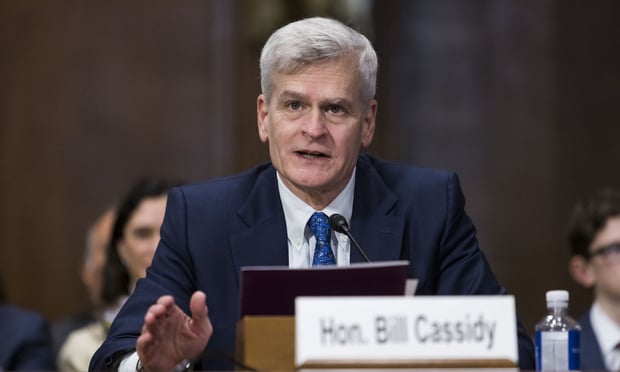 Senator Bill Cassidy (R-LA). Photo: Diego M. Radzinschi/ALM
Senator Bill Cassidy (R-LA). Photo: Diego M. Radzinschi/ALM
Building on employee stock ownership plan (ESOP) riders under SECURE 2.0, Senator Bill Cassidy, M.D. (R-LA), chair of the Senate Health, Education, Labor, and Pensions (HELP) Committee, introduced two bills last week to strengthen ESOPs and omit ESOP contributions from 401(k) plans. The two bills are the Employee Ownership Representation Act and the Employee Ownership Fairness Act.
ESOPs are employee retirement plans in which stock in the company is held collectively by the company’s employees and often supplements a company’s 401(k) plan. However, employee contributions to ESOPs count toward the IRS contribution limits, set at $23,500 for 2025; and employer contributions to ESOPs also count toward the total employer contribution limit.
Recommended For You
“ESOPs put more money in Americans’ pockets and lead to a more productive workforce,” said Dr. Cassidy. “By strengthening ESOPs, we strengthen workers and their ability to invest in their futures.”
The Employee Ownership Fairness Act would allow ESOP participants “to contribute into 401(k) plans without exceeding their ESOP or 401(k) contribution limits. As a result, employees will save more money for retirement and can invest more in their employer’s stock,” said Sen. Cassidy.
“Unlike defined contribution plans where the amount contributed is determined by the employee, ESOP contributions reflect growth in the company and its value rather than planned contributions by the employee or employer,” reads the The Employee Ownership Fairness Act. “This is why the vast majority of ESOPs also sponsor a defined contribution plan … which facilitates the diversification of workers’ retirement savings.”
The Employee Ownership Fairness Act authorizes ESOPs to provide generous and diversified benefits by permitting ESOPs to contribute into 401(k) plans without exceeding their ESOP or 401(k) contribution limits. As a result, employees will save more money for retirement and can invest more in their employer’s stock.
The Employee Ownership Fairness Act expands existing IRS private letter rulings that allow ESOPs to apply the contribution limit separately for employer contributions to repay ESOP loan principal and employer contributions to other defined contribution plans. The bill provides that neither contributions to repay ESOP loan principal nor contributions of employer stock to the ESOP would even be taken into account for purposes of the contribution limit.
Related: Employee stock ownership plans: A Q&A with Alex Mumblat
The Employee Ownership Representation Act would amend ERISA by adding two new ESOP board members to the 15-member ERISA Advisory Council, which acts as an advisory group on ERISA issues, primarily for the Department of Labor. There are currently no members specifically set aside on the council to represent the interests of ESOPs. This would finally give ESOPs representation on the council to advocate for the interests of employee-owned companies.
“Currently, companies with leveraged ESOPs that might run up against contribution limits typically deal with the problem by extending the length of the internal loan so that annual allocations fall within the limits, “writes Corey Rosen, National Center for Employee Ownership founder.
“In some companies with very generous plans, even doing this means that the entire contribution limit is allocated to the ESOP. That means that employees who want to get a tax deferral for contributing to a 401(k) plan the company sponsors may be unable to do so. Additionally, the company may have to deny matching contributions it otherwise would make. The Employee Ownership Fairness Act would address those issues.”
“ESOP employees are currently penalized in their ability to save in the 401(k) plans because when their employee-owned company does well, it counts against their contribution cap and their employer match. Employee owners should be able to save just as much from their wages in their 401(k)’s as any other worker,” said Jim Bonham, the CEO of the ESOP Association, which supports both bills.
© 2025 ALM Global, LLC, All Rights Reserved. Request academic re-use from www.copyright.com. All other uses, submit a request to [email protected]. For more information visit Asset & Logo Licensing.








